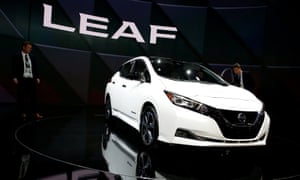Carmaker ‘cooperating fully’ with inquiry into whether it accurately reported executive pay

A Nissan Leaf hybrid car at the North American International Auto Show in Detroit.
Photograph: Brendan McDermid/Reuters
Nissan confirmed on Monday it was being investigated by the US Securities and Exchange Commission (SEC), undermining its efforts to move on from the arrest of former leader Carlos Ghosn.
Ghosn was arrested in November by Japanese authorities after Nissan reported him for allegedly under-declaring his income by millions of yen.
Nissan quickly removed him from his position as board chairman following the arrest, but insisted any wrongdoing was limited to Ghosn and another executive. Ghosn, who has denied the allegations, remains in detention in Tokyo.
Nissan said in a statement it “can confirm that we have received an inquiry from the SEC, and are cooperating fully. We cannot provide further details.”
The US financial markets watchdog is in the early stages of an investigation and has requested documents from both Nissan and Ghosn, the Wall Street Journal reported (£). While Nissan’s shares are listed in Tokyo, some financial instruments are traded on US exchanges.
The SEC investigation comes after Ghosn’s final resignation last week from Renault, the French carmaker of which he was chairman and chief executive alongside his roles at Nissan and Mistubishi. Ghosn, one of the best-known executives in the car industry, was seen as the architect of the alliance between the three carmakers.
Renault last week appointed Thierry Bolloré as chief executive to replace Ghosn on operational matters. Outgoing Michelin boss Jean-Dominique Senard was made chairman, with a brief to manage the alliance relationship with Nissan.
Executives at both Nissan and Renault have expressed their desire to remain part of the alliance, although the Nissan chief executive, Hiroto Saikawa, has suggested that the balance of power could shift. Under the alliance’s unusual cross-shareholding structure, Renault is the dominant partner despite Nissan contributing more profits.
Nissan is planning an extraordinary general meeting of shareholders in April to discuss the appointment of a new director on its board nominated by Renault.
The outcome of any leadership struggle is politically sensitive in both companies’ home countries. The French government holds a 15% stake in Renault.